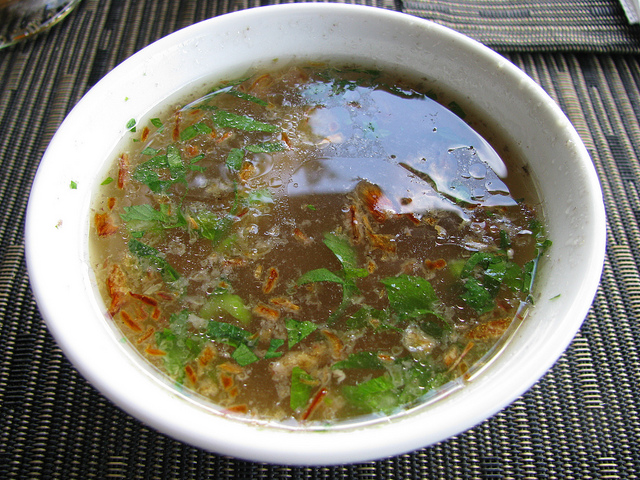Sometimes, when we choose the path to health and recovery, we have to put our food preferences and lifestyle choices aside.
I have been vegan for the majority of my life. The taste and the idea of eating something that was once a living, emoting creature or is derived from one just does not settle well with me. Healthy digestion and assimilation of nutrients begins with the thoughts we have about the food we choose to ingest. [1]
We cannot assimilate good nutrients from food when we harbor negative thoughts about the very food we are consuming. Our intestinal track is like a second brain, it senses every thought we have and emotion we feel. From a Buddhist tradition, good karma cannot come from ingesting something that endured any form of pain or suffering. [2]
So having had a recent flair up with Irritable Bowel Syndrome, I was told (and read about) the great benefits of bone broth. However the decision to incorporate animal products into my diet has let me in a quandary, how can I remain true to my personal beliefs and my repair my body?
For the most part, Buddhists do not consume animal products because to do so would be contrary to one of its basic tenants “do good.” This is violated when you consume an animal that was in pain or if you knowingly consume animal that was killed for such purpose. [3] If we look at the basic tenant to “do good,” it is really about engaging with love and compassion toward other living things.
If we look at the world today, it is hard to completely avoid the killing of animals. Even if we choose to refrain from eating animal products, animals will still be raised for human consumption. A lot of our everyday products are derived from animals. Our choice alone will not stop inhumane cruel practices in animal husbandry. So, as a Buddhist, it is still a choice to be vegan. It is possible to consume animal products and “do good.”
As Buddhists, we must be aware of the connections to our surroundings. Before each meal, I take a moment to honor the path that what I am about to eat took to get to me. That being said, I also start to think about the consumption of bone broth and its many healing properties.
By choosing to allow the nutrients of this once living creature into myself, I am doing good to my body. As a living beings, we need protein, minerals and many nutrients to live a good life. The bones often go to waste. By consuming them in a nourishing broth, we honor each part of the animal and use all of its goodness rather than tossing it aside.
Being good, at least in my mind, is becoming educated about the path the food has taken. Knowing that the animal we are about to consume has received only the best care alleviates any concern that we are inflicting harm in any way. Here are some things to look for if you chose to incorporate animal products into your diet.
>>> Grass fed—provides the animal the closest thing to its natural diet.
>>> Pasture raised and free range—they receive the majority of their diet from organically managed pastures and stored grains (when weather does not permit outside grazing).
>>> Antibiotic-free.
>>> Hormone-free.
Most importantly, be thankful for the kindness that this creature was shown, knowing that the care it was given carries onto us as we consume its nutrients to in turn give loving care to ourselves. This is a continuation of “doing good.”
And when looking for quality bone broths, look for someone who makes it locally. It is always good to give back to our community, but if not, Bone Broths Co. is a good commercial alternative. [4]
Sources:
[1.] Nutritionvolition.com: The Mind-Body Connection
[2.] Engageddharma.com: Buddhists Eat Meat
[3.] Engageddharma.com: Buddhists Eat Meat
[4.] Bonebroths.com: Our Bone Broth
Relephant:
6 Ways to Promote Natural Healing.
~
Author: Jane CoCo Cowles
Editor: Catherine Monkman
Photo: Shankar S./Flickr












Read 0 comments and reply